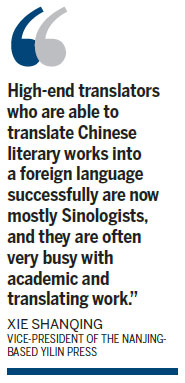Wanted: a few good decoders
Updated: 2014-09-03 07:26
By Liu Zhihua(China Daily)
|
||||||||
When Xie Shanqing, vice-president of the Nanjing-based Yilin Press, asked a famous Sinologist to translate the literary works of established Chinese writer Ye Zhaoyan, the Sinologist said Xie would need to wait two years.
Xie, who is also the publishing house's director of international cooperation, was not surprised. She said the shortage of good translators is one of the reasons why Chinese literature hasn't fully reached its potential on the world stage.
"Translation of literature works is very difficult, because translators need to master at least two languages to get over the obstacles from cultural gaps and language differences," Xie says. "High-end translators who are able to translate Chinese literary works into a foreign language successfully are now mostly Sinologists, and they are often very busy with academic and translating work."
Another issue is the lack of professional overseas marketing for Chinese literature, Xie adds. Also, many of today's readers tend to choose popular fiction over literary works, and cultural differences make it hard for foreigners to understand and appreciate a book that has been translated from Chinese, Xie adds.
Yilin Press plans to publish and globally distribute works of famous writers from Jiangsu province, including Ye Zhaoyan and Su Tong. Xie says the publishing house feels obligated to promote Chinese literature to the world, regardless of how well the books sell.
To ensure that Chinese literature reaches a wider audience, Xie suggests the government put a greater emphasis on cultivating and attracting high quality translators.
Li Hongjie, president of the China International Press, says: "The most important thing to make Chinese literature popular in the world is to select the right works to export."
Chinese contemporary literature is insightful, but many of the works are about local issues, and are sometimes hard for foreigners to understand, Li says.
Li uses Mai Jia's novel Decoded as an example. The first volume of the Spanish version of the book sold around 30,000 copies, a record for Chinese writers publishing a book abroad. Li says the book tells a great story about humanity and fate that appeals to everyone, Chinese and foreigners, and that is what made it a success.
"It is time we change our strategy when exporting books," Li says. "We cannot export whatever copyrights and books we want to, but we need to export works that foreigners would be interested in."
liuzhihua@chinadaily.com.cn

(China Daily 09/03/2014 page19)

 Star Stefanie Sun holds concert in Beijing
Star Stefanie Sun holds concert in Beijing
 Faye Wong's manager refutes star's drug rumors
Faye Wong's manager refutes star's drug rumors
 Lu Yi and daughter Bei Er pose for street snaps
Lu Yi and daughter Bei Er pose for street snaps
 Photoshoots of actress Li Xiaomeng
Photoshoots of actress Li Xiaomeng
 Council of Fashion Designers of America Awards
Council of Fashion Designers of America Awards
 Fan Bingbing, first Chinese actress in Barbie Hall of Fame
Fan Bingbing, first Chinese actress in Barbie Hall of Fame
 Awarding ceremony of 2014 hito Pop Music held in Taipei
Awarding ceremony of 2014 hito Pop Music held in Taipei
 Zhao Liying's photo shoot for Children's Day
Zhao Liying's photo shoot for Children's Day
Most Viewed
Editor's Picks

|

|

|

|

|

|
Today's Top News
US doctor in Liberia tests Ebola positive
China's August PMI decreases, but slightly
Monopoly probes treat firms equally
Gene to fight Parkinson's discovered at UCLA labs
China's Uncle Sam ready to test US market in NYC
Beijing spruces itself up for APEC summit
New Budget Law to change the game
Microsoft asked to explain monopoly accusations
US Weekly

|

|







